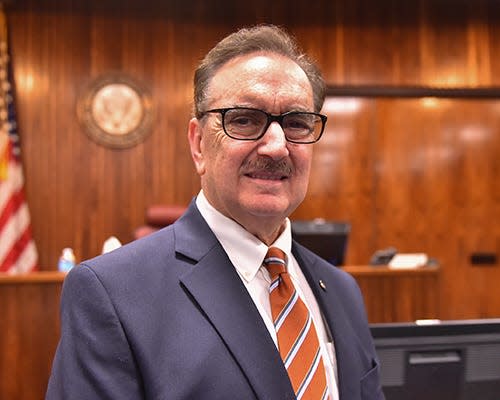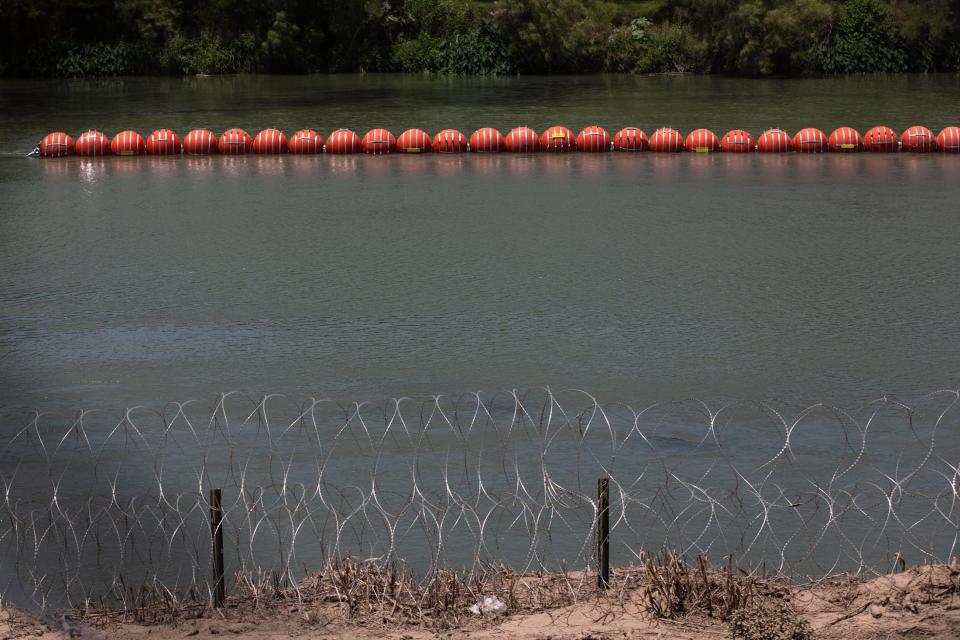From Hawaii to Texas: Meet the judge who will preside over US v. Abbott federal lawsuit
- Oops!Something went wrong.Please try again later.
- Oops!Something went wrong.Please try again later.
AUSTIN — In late 2012, Judge David Alan Ezra stepped down from the federal bench in Hawaii and agreed to be reassigned to Texas to help manage a growing backlog of immigration cases.
Ezra was 65, the age at which federal judges may opt to take what's called senior status where they can handle a lighter caseload and allow the president to nominate a replacement.

Even though Ezra was born in Ohio and grew up in Hawaii, the move to Texas wasn't just out of the blue. He earned his undergraduate and law degrees from St. Mary's University in San Antonio, and his wife was from the Lone Star State, according to several online biographies.
But the part about helping clear some of the immigration cases piling up in the federal court system's Western District of Texas would prove prescient way back in 2012.
Fast forward almost 11 years and now the veteran jurist has caught what might be the mother of all immigration cases. Ezra will be the presiding judge in U.S. v. Abbott, which was filed by the Justice Department last month over the governor's decision to place buoys in the Rio Grande without federal permission.
And the case may well end up deciding how much authority the Texas governor has in his effort to curb unlawful immigration.
It's sometimes tempting to predict how a federal court case will go by looking at which president nominated the judge. That might be a dicey proposition in the lawsuit that pits Republican Gov. Greg Abbott against the Democratic Biden administration.
Ezra was nominated to the federal bench in Hawaii in 1988, the final full year of Ronald Reagan's tenure as president. As it turns out, then-Sen. Joe Biden chaired the Senate Judiciary Committee that sent Ezra's nomination to the full chamber where it was approved unanimously.

But that was an era before every judicial nomination handed down from the White House was seen as an invitation to a red-team, blue-team cage match, and certainly before any president would expect a judge he nominated to be "loyal."
And federal judges, who have lifetime appointments, sometimes evolve in their political thinking as their time on the bench progresses.
Cases in point: Supreme Court Justice John Paul Stevens was appointed in 1975 by Republican President Gerald Ford. When Stevens retired in 2010, he was the dean of the court's liberal wing. Justice Byron White was appoint to the high court in 1962 by Democrat John F. Kennedy. A decade later, he was a dissenting vote in the landmark abortion case, Roe v. Wade. And in 1986 wrote he the majority opinion allowing states to restrict homosexual conduct.
More: MORITZ: Lawsuit against Texas a no-lose bargain for Abbott − and maybe a no-win for Biden
Here's what we know about Ezra. At 39, he was among the youngest federal judges when he assumed the bench in Hawaii. And he went on to become the state's longest serving active federal judge.
He's also a former vice president of the U.S. Federal Judges Association and a former president of the Ninth Circuit U.S. District Judges Association.
Since coming to Texas, Ezra maintains court chambers in both Austin and San Antonio and he is a "visiting jurist in residence" at St. Mary's.
More: How the buoys and other parts of Operation Lone Star affect life in Eagle Pass
In 2007, he was awarded the Rosewood Gavel Award for "his contributions to the adjudication of justice," according to his federal court bio. That puts in the same company as retired Supreme Court Justice Sandra Day O’Connor.
Supporters of the First Amendment cheered his ruling that overturned a law in Hawaii that prohibited reporters from speaking with prisoners. The Hawaii Chapter of the Society of Professional Journalists also awarded Ezra its Freedom of Information Award.
As is the practice with judges at every level, Ezra declined to publicly discuss the case involving Abbott and the federal government.
The federal action is still in the early stages with both sides submitting motions regarding ground and procedures. It will be up to Ezra to rule on all of them, which may or may not offer clues on how he'll handle this politically charged legal drama.
And because the case is politically charged, expect it to be a magnet for the media. So once the courtroom action begins, Texas will likely have the opportunity to get to know Judge Ezra a little better.
John C. Moritz covers Texas government and politics for the USA Today Network in Austin. Contact him at jmoritz@gannett.com and follow him on Twitter @JohnnieMo.
This article originally appeared on Corpus Christi Caller Times: The judge in US v. Abbott hails from Hawaii and was appointed by Reagan

